Wildfires underscore need for watershed security
Banner photo by Emma Girard. Mabel Lake, B.C. 2023 Lake Biodiversity Photo Challenge ‘Lake Impacts’ Category.
Read the web version here.
It’s that time of year where the last of the winter snow is melting, exposing expanses of dry, dead vegetation — the perfect ingredient for wildfires when combined with higher than usual temperatures. Extreme fire danger currently extends across the Prairie provinces, northeastern B.C., and the Northwest Territories, and has triggered a provincial state of emergency in Alberta. Low snowpacks and unseasonably warm spring weather means drier watersheds. It’s a pivotal time to be collecting the data needed for sustainable water management and climate adaptation for communities across Canada. Read about our latest contributions to the watershed security movement in this month’s newsletter.

Qʷúʔ, siwɬkʷ (water) data for self-determination
For Indigenous Peoples, data is more than a collection of numbers and information; data is connected to culture, identity, traditions, and self-determination. It’s with this perspective that the Nicola Watershed Governance Partnership (NWGP) — a government-to-government initiative between the Five Nicola First Nations (collectively known as the Nicola 5) and Province of B.C. — identified the need for a sovereign qʷúʔ, siwɬkʷ (water) data hub to house watershed information. Living Lakes Canada was invited to build a water hub that supports NWGP information governance, bringing together Indigenous Knowledge and Western science to support collaborative efforts in watershed protection.


Ontario groups learn about bugs as bioindicators
During the first week of May, our biomonitoring team was in Ontario working with several community groups to help meet the growing demand for biomonitoring training across Canada and build capacity for long-term monitoring in local communities. A recent addition to the team, our biomonitoring technician Gwen Janz assisted in these trainings. While new to biomonitoring, Gwen brings with her experience in restoring and monitoring both terrestrial and aquatic ecosystems in both non-profit and government sectors.


2023 UN Water Conference: Putting water first
From March 22-24 in New York, over 6,000 participants exchanged water-related concerns, research, knowledge and pledges to mark the first United Nations conference on water since 1977. Representatives from around the world included Living Lakes Canada’s Nicole Trigg and Georgia Peck, who took in three full days of assemblies, presentations and workshops. Overall, key themes and takeaways from the conference mirrored the relevance, innovation and timeliness of the water stewardship work that Living Lakes Canada has been leading for almost 20 years.


Living Lakes Canada Executive Director receives two BC Achievement Awards
On May 10 at the Government House in Victoria, Living Lakes Canada Executive Director Kat Hartwig was one of 20 outstanding community leaders to receive a BC Achievement Community Award, and was invited to give an address as the sole recipient of the Mitchell Award of Distinction for her lifelong work in environmental conservation and freshwater protection.
As the founder of Living Lakes Canada, Kat has impacted countless communities across the Columbia Basin, BC and Canada. From creating award-winning water stewardship programs, to helping guide provincial and federal policies around freshwater protection, to advocating for the inclusion and leadership of Indigenous voices, Kat has led a paradigm-shifting approach to water management.


2023 Lake Blitz and Photo Challenge are underway
For 2023, our 3rd annual National Lake Blitz has successfully recruited 440 volunteers across 10 provinces and territories who are monitoring their chosen lake twice a month until September! All the data can be viewed in our interactive Lake Observation Map. As the sister event to the Lake Blitz, the Lake Biodiversity Photo Challenge has also launched and stunning photo entries are pouring in. Submit your lake photos in four categories to have a chance to win awesome prizes from Earth Rangers, LUSH, Kicking Horse Coffee, Float-Eh, Teadore Co and Laykhaus! You can enter using the website form or tag your pics on social media with #LakeBlitzPhoto2023.


Sockeye Salmon release in the Columbia River
It was May 19th, 2022 when Trinda Cote, Indigenous Youth Ambassador with Living Lakes Canada, had the opportunity to release Sockeye Salmon fry into the Columbia River. Sqlelten7úw̓i (Sockeye Salmon) haven’t been seen in the waters for over 82 years and, as part of the Columbia River Salmon Reintroduction Initiative, this ceremony to call the salmon home was a grounding and inspiring experience.


Monitoring program making headway in the alpine
High elevation ecosystems are more vulnerable and expected to experience climate impacts quicker than lower elevations. Our High Elevation Monitoring Program aims to generate baseline data on high elevation ecosystems that are data deficient and establish long-term monitoring to understand how these sensitive areas are responding to climate change over time. In 2022, the program monitored two alpine areas in the Selkirk Mountains of the West Kootenays. A successful pilot year has led to the expansion of the project in 2023 into three new areas.


Join the Living Lakes Canada team
Are you passionate about all things water? We’re growing our team of incredibly dedicated people to help expand our water monitoring efforts across Canada. Here are our current job opportunities:

Enjoy reading our newsletter? Share it with a friend!





